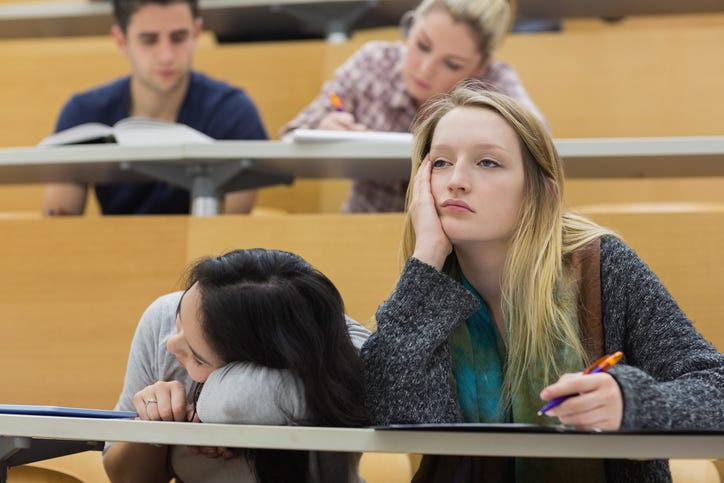
When selecting your university classes next year, it might be wise to avoid those that begin too early.
A new study has found a direct correlation between getting up early and poor grades.
Researchers at Singapore's Duke-NUS Medical School analyzed data collected from tens of thousands of students and found those with early classes were overtired and received poorer grades than those who started later in the day, according to findings published in the journal Nature Human Behavior.
"If the goal of formal education is to position our students to succeed in the classroom and workforce, why are we forcing many university students into the bad decision of either skipping morning class to sleep more or attending class while sleep-deprived? The take-home message from our study is that universities should reconsider mandatory early morning classes," Associate Professor Robert Gooley, one of the study's authors, said in a statement.
Research in recent years has shown that postponing the start time of high schools improves the amount of sleep that students get and reduces their sleepiness during school hours. But findings are mixed about whether this has a positive impact on grades.
To determine the impact specifically on university students, the research team used student Wi-Fi connection data, log-ins to university digital learning platforms, and activity data from special sensing watches to conduct large-scale monitoring of class attendance and sleep behavior.
From the data, the researchers found that early class start times were associated with lower attendance, as many students regularly slept past the start of such classes. When students did attend an early class, they lost about an hour of sleep. Morning classes on more days of the week were also associated with a lower grade point average.
"University students who regularly attend classes and sleep well are more likely to get good grades. Attending classes increases students' interactions with instructors and classmates and provides structured time for covering key learning points. Sleeping well is also important for optimizing cognitive performance and readiness to learn," the study points out. "Inadequate sleep impairs attention and memory processes, which may prevent students from reaching their full learning potential in class. Moreover, feeling tired and oversleeping are frequently cited as reasons why university students skip classes."
The study suggests that universities should adopt practices that improve students' attendance rates and sleep behavior to position them to succeed in the classroom and workforce.
The research isn't over yet, either. The team is now investigating differences between class attendance, sleep, wellbeing and academic performance between early birds and night owls.
"We expect to find that evening-type students will be at a learning disadvantage in early morning classes and have lower class attendance, shorter sleep, poorer mental health and lower grades compared with their peers," Gooley said.


